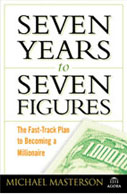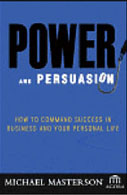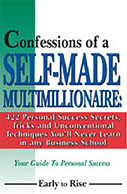- WISE: Michael Masterson on the true value of money
ALSO IN THIS ISSUE: - What you can learn from Jay Abraham about getting your customers to buy more from you
- How much does Google know about you? Here's how to find out...
- What politicians have known - for thousands of years - about raising taxes
- Do you know what your "metier" is?

* Highly Recommended * There Has Never Been a Plan for the Little Guy... Till Now! The Internet has leveled the playing field. The little guy can now compete and ultimately humiliate the "big" companies. If he knows how... Imagine having no money worries, and the time to enjoy it too. This doesn't have to be a dream anymore. Three of the biggest names on the Internet reveal their most powerful money making strategy. The same one they've secretly been using behind your back. Today you'll discover how to force the Internet to finally pay up. This is previously classified information, and you can only find out about it here. - Patrick Coffey 
"The most valuable thing that money can buy you is the freedom to spend your time as you see fit." - Michael Masterson in Automatic Wealth How to Dramatically Boost Your Personal Income By Michael Masterson Want to double your income? In a two-year period, I doubled and then redoubled my income by doing what you'll read about in today's message. At least a half-dozen people I know personally have also doubled (or tripled or quadrupled) their incomes with the same system. Let's start with a little exercise in logic. You own an ice cream shop. You pay George, an ordinary worker, $50 a day to stand behind the counter and sell your product. After paying for the cost of the product, rent, overhead, and George's salary, you are left with $25 a day in profits. One day, George quits and his brother, Dan, replaces him. Dan is a harder worker than George and, as a result, he increases your daily profit to $50 a day - $25 more than you were getting before. Question: To keep Dan happy, would you increase his salary by, say, $5 a day? Answer: Of course you would. Now Dan quits and in walks Charlie. Charlie is better than Dan. He not only doubles the profit again, to $100 a day, he's got all kinds of ideas about opening up another ice cream shop, hiring Dan to run it, and bringing in more daily profits to your business. Question: How much extra would you pay Dan? Answer: Unless you were a fool, you'd pay him an awful lot. You might even cut him in on the action. Before I decided to get rich in 1982, I put in 20 years working for all sorts of different companies. Looking back at my performance as a worker, I'd honestly say my productivity was all over the place. I've been a good employee, a bad employee, and everything in between. The day after my big decision was made, I recognized that I needed to increase my income - a lot. To do that, I realized I could no longer afford to be bad, mediocre, or even good. To merit big, dramatic salary increases (for that's what I was aiming at), I knew I had to learn how to become valuable and then invaluable to my employer. In the real world, ordinary employees earn ordinary salaries. Good workers - individuals who work harder and smarter to accomplish more - get above-average pay. But above-average pay won't make you rich. To gain wealth, you need huge increases - 25%, 50%, and even 100%. And if you can make yourself valuable (and eventually invaluable) to your business, you can get raises like that. So how do you become invaluable to your business? The answer. To become invaluable to your business (it doesn't matter whether it's a business you work for or a business you own), you must: 1. Learn (and eventually master) a financially valued skill. 2. Apply that skill to your company's core profit-generating activities. Step One: Learning a "Financially Valued" Skill A financially valued skill is one that plenty of other people are willing to pay good money for. What is "good money"? I'd say $150,000-plus. This is a somewhat arbitrary number, but it is not far from the mark. To get wealthy, you need to invest - and not just $500 or $1,000. You need tens of thousands of dollars. To get that kind of scratch, you need to make six figures. In today's world, an income of $150,000 a year will allow you to enjoy a reasonably comfortable lifestyle and put a nice chunk of that into savings. A typical kid out of college today can expect to earn about $31,000 and get an average raise of about 4% or 5% - which will put him about one or two percentage points ahead of inflation. As I explain in Automatic Wealth and Automatic Wealth for Graduates, that kind of income growth is enough to make you reasonably wealthy over time - if, that is, you scrimp and save for 40 years! By learning a financially valued skill, the typical college graduate can double or triple his income in a year or two. And then, by applying that skill to his company's main growth source, he can see his income skyrocket in not so many years. You don't need to pinch pennies (or give up your Starbucks lattes) to get rich. What you need to do is greatly increase your income. The trick to improving your wealth while you enjoy your life is to limit the growth of your expenses as your income grows. Taking the example of our college graduate. If he can get comfortable living on a $30,000 salary and then double his income in two years and double it again two years later, he'll be earning $120,000 by year four. (This is not unusual for people who master a financially valued skill.) By investing most of his after-tax income into real estate, stocks, and small business opportunities, he can see his net worth explode in a relatively short time. I'm talking about three to seven years. Let's talk theory for a moment. There are three basic kinds of jobs in the business world: administrative, technical, and profit-generating. - Administrative jobs include most positions in corporate management, product fulfillment, operations, and customer service, as well as some positions in finance and accounting.
- Technical jobs include most positions in information technology and engineering, and some legal, financial, and accounting positions.
- Profit-generating jobs are those that are directly involved in producing profits for the company. Profit generators include marketers, salespeople, copywriters, people who create new products, and the people who manage all of these employees. The leading profit generator is usually the CEO, whose main job is to deliver a bottom line.
Administrative workers, on the average, are the poorest-paid group. Generalists by training, they compete against a large pool of other generalists in jobs that require no special skills or talents. As an administrator, and a very good one, you can expect to see your income rise as your performance improves. But, typically, it will be at the 4% or 6% level - probably not enough to meet your wealth-building goals. Technical workers are usually better paid than their administrator counterparts. This is especially true at the beginning of their careers, when even an entry-level position requires a high degree of specialized knowledge. Computer engineers, information technology people, and certified public accountants frequently start at higher salaries than do fulfillment managers and customer service clerks, but the difference tends to diminish over time. Top engineers often make more than operational vice presidents, but not much more. Profit-generators are usually the highest-paid employees. They not only bring in a significantly higher salary than technical and administrative positions, they also earn more than most professionals (doctors, lawyers, dentists, etc.). More important, they have the greatest potential for income growth. The biggest advantage of profit-generating jobs is that they give you a chance to share in the profits. Getting a "cut of the action" is, far and away, the fastest way to a monster income. So, which are the profit-generating jobs? They fall into only four categories: Salespeople, new-product makers, marketers, and profit managers aren't the only people needed in business, but they are the ones who help businesses grow and produce profits. All other employees - including the most valuable lawyers, engineers, and accountants - are considered "expenses" ... especially when times get tough. Step Two: Applying Your Skill to the Company's Profit Stream Profit producers are - almost by definition - valuable employees. That's why they customarily out-earn their equally well-educated and equally hardworking colleagues. To make the transition from good to valuable, you must learn a financially valued skill and begin using it to help your company produce profits. What are the financially valued skills? There are four, corresponding to the four profit-producing job categories: Are you in a profit-producing job now? If you are not sure, ask yourself: "In the eyes of upper management, is the work I do considered (1) nice but unnecessary, (2) necessary but not of much interest to them, or (3) essential to the growth and profitability of the business?" Be honest. But if you feel that your job falls into either (1) or (2), don't worry. You don't need to abandon your metier. If you are currently working as an accountant, engineer, or administrator, you can still maintain your current job (at least as long as you want to) as you transition into a more financially valued role in your business. Starting today, commit to gradually developing the skill of a salesperson, marketer, product producer, or profit manager. Make another commitment to apply that skill (or those skills) to the growth and profitability of your business. By voluntarily contributing more than your fair share of work to the business, you'll be seen as a motivated, achievement-oriented player. Some of your colleagues will resent you for that, but don't pay them any attention. The people who really matter in any growing business are the profit producers themselves - and they will see you as someone who can help the common cause. Your objective is to start making significant contributions to the bottom line as soon as possible. Here's how: Ask yourself which people in your company earn the most. Identify at least three distinct jobs. Determine which of these jobs you would most like to do. Then learn about that job. Find out what it takes in terms of hours and days. Find out what it typically pays and when it pays more and why. Ask about the daily routine, the common problems, the biggest challenges, and the best rewards. Ask. Observe. Read. Keep it up, day after day, until you start to feel as if you understand it. When you feel ready, talk to your boss about your plans. Then approach key people in the department you're interested in. Tell them (honestly) that you think their field is something you'd be good at. Say you've been learning about it in your free time and you'd like to volunteer to help them out so you can learn even more. People will be impressed by your willingness to dive in and give them a hand. If your intentions are sincere and your follow-up is diligent, you'll soon enjoy a reputation for being an up-and-comer. Remember, income producers are viewed as not just "good" but "necessary" and "desirable." By making yourself one of the few people in your company who know how to generate profits, you give yourself the greatest chance of getting big raises, big promotions, and earning a six-figure income. I remember when JSN gave me the first big raise. He said, "To be worth a $10,000 raise to me, you must be able to produce at least $100,000 worth of extra value to the company's bottom line." I didn't understand it at the time, but now I see how right he was. Looking at all the businesses I've run in the past 20 years, I can see how expensive it is to support any growing organization. Employees who do no more than pay for themselves are in fact an expense for the company. The rare and truly valuable employee not only pays for himself but also for other employees ... and produces profits. That's why JSN's 10-for-1 rule makes sense. If you want to get a raise that's $1,000 more than ordinary, make sure you've been a major contributor to an idea that will generate at least $10,000 in additional, net profits for your company. So if you want to increase your current income by $25,000, you are going to have to find a way to increase business profits by about $250,000. And that's not just once. It's this year and next year and every year thereafter that you expect to maintain that much-higher-than-average salary. Here's what you can do to get started on that goal right now: 1. Figure out how your business creates profits. 2. Figure out how your job contributes to that process. 3. Determine how you can "modify" your job so that your work results in more profits. (And once you start bringing in more profits for the company, make sure the people who give raises know about it.) 
* Highly Recommended * How To STOP Uncle Sam From Cheating You Out Of $55,909 Greg W. could have kept quiet and handed over $55,909 in taxes that he didn't even owe. But instead, he took advantage of a little-known (but entirely legal) tax loophole that specifically helps investors keep their income and grow their money faster. Click here to learn more. 
Keep Telling Your Customers How Good You Are Master marketer Jay Abraham makes this good point: To encourage repeat business, you should constantly remind and re-educate your customers about what you do for them. Don't make the mistake of thinking they are watching everything you do and appreciating all the improvements and additions you are creating. If, for example, you buy a top-line BMW, you should receive something from your dealer every month, pointing out how your relationship with BMW can further enhance your life. One effort might be a small brochure that offers a free video course on how to better use the entertainment system. Another might be a booklet that tells you how to brake safely using BMW's patented braking system. To do a good job re-educating your customers, you must talk about genuine benefits - which means you must provide them. Make your products better, and then tell your customers why they are better and how to use them.  Turn Your Hotel Room Into a Gym By Craig Ballantyne Hotel gyms have a reputation for being tiny, ill-equipped, and crowded at peak hours. So next time you're on the road and need to stick to your workout plan, here are a few exercises that can turn your hotel bed into an impromptu exercise device. Beginner Routine: 1. The incline push-up. Instead of struggling through full push-ups, place your hands on the bed to reduce the difficulty. Lower your chest toward the bed and push back up to the start position. 2. The bed-squat. Stand at the side of the bed, facing away from it. Push your hips back and lower your body until your butt rests on the bed. Then push through your feet to return to the standing position. (You can use a chair instead of the bed.) Advanced Routine: 1. Advanced push-ups. Place your feet on the bed and your hands on the floor. Sink down, bending your elbows. Then push up until your arms are straight. 2. The advanced bed-squat. Lift one leg off the ground and point it straight ahead. Push your hips back and lower your butt to the bed as slowly as your supporting leg will allow. Extend both arms straight ahead for balance. When your rear end touches the bed, push with your supporting leg to return to the start position. Alternate between the two exercises, doing 8 to 12 repetitions each. Do up to three sets for a quick five-minute workout. [Ed. Note: Craig Ballantyne is an expert consultant for Men's Health magazine and the creator of the Turbulence Training for Fat Loss system. As a writer for ETR's natural health e-letter, Craig will give you practical strategies and real-world scientific discoveries that can help you melt off the pounds, pack on muscle and eliminate the underlying causes of disease.] 
It's Good to Know: 5 Things You Might Not Know You Can Do on Google 1. Enter "define" in the Google search box, then a colon, then a space, and then the word or expression you want defined. 2. Find out what Google thinks about just about anything or anyone (including you) at www.googlism.com. 3. Enter an airplane's tail number in the Google search box to find out the plane's service history. 4. Yankees or Red Sox? Heaven or hell? Pen or sword? Which one gets more Google hits? Find out this and much more at www.googlefight.com. 5. Enter a few key ingredients to get many recipes. (Source: David Hochman in The New York Times) 
* Highly Recommended * Does This Situation Sound Familiar To You? 1) You have absolutely no previous knowledge about making money from the internet or any technical knowledge about computers... 2) You don't want to worry about products, credit card processing, shipping or customer issues... 3) You want nothing to do with network marketing, buying and selling on eBay, internet gambling or any gimmicks either... 4) But yet you realize there's a ton of money to be made on the Internet and would like to get started. If so, here's an opportunity which really does work, that anyone can follow and put into practice quickly in just an hour of your spare time from home. Read about it here... - Charlie Byrne 
Word to the Wise: Metier Your "metier" (meh-TYAY) is your specialty - work or an activity that you are especially suited to do. It is a French word that comes from the Latin "ministerium" ("ministry"). Example (as I used it today): "You don't need to abandon your metier. If you are currently working as an accountant, engineer, or administrator, you can still maintain your current job (at least as long as you want to) as you transition into a more financially valued role in your business." [Ed. Note: Become a more persuasive writer and speaker... build your self-confidence and intellect... increase your attractiveness to others... just by spending 10 VERY enjoyable minutes a day with ETR's Words to the Wise CD Library.] | 













No comments:
Post a Comment